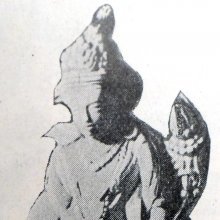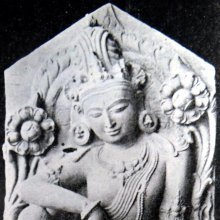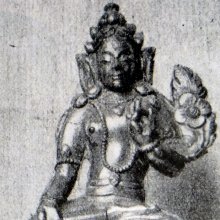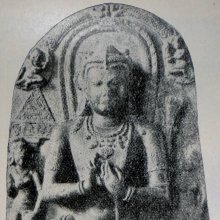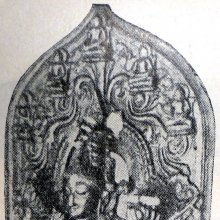Paryanka, Paryaṅka, Paryamka: 22 definitions
Introduction:
Paryanka means something in Buddhism, Pali, Hinduism, Sanskrit, Jainism, Prakrit, Marathi. If you want to know the exact meaning, history, etymology or English translation of this term then check out the descriptions on this page. Add your comment or reference to a book if you want to contribute to this summary article.
Paryanka has 21 English definitions available.
Images (photo gallery)
(+7 more images available)
Languages of India and abroad
Sanskrit dictionary
[Deutsch Wörterbuch]
Source: Cologne Digital Sanskrit Dictionaries: Böhtlingk and Roth Grosses Petersburger WörterbuchParyaṅka (पर्यङ्क):—(von añc mit pari oder pari + aṅka) m. = palyaṅka [Pāṇini’s acht Bücher 8, 2, 2.]
1) Ruhebett [Amarakoṣa 2, 6, 3, 39.] [Hemacandra’s Abhidhānacintāmaṇi 683.] [Anekārthasaṃgraha 3, 60.] [Halāyudha 2, 152.] [Kauṣītakyupaniṣad] in [Weber’s Indische Studien 1, 397. 401.] (vidyā). [Mahābhārata 3, 12896. 4, 96. 5, 1188. 13, 1452. 2834.] [Harivaṃśa 889. 4651. 6320.] [Rāmāyaṇa 2, 32, 9. 34, 20. 72, 11.] [Suśruta 1, 367, 21.] [Varāhamihira’s Bṛhajjātaka S. 69, 22. 78, 11. fgg.] [Bhartṛhari 3, 88, v. l. 93.] [Spr. 772.] [Kathāsaritsāgara 10, 35. 32, 71. 36, 86.] [Bhāgavatapurāṇa 3, 23, 16.] [Pañcatantra I, 190. 238, 20.] [Hitopadeśa 29, 11. 42, 8.] paryaṅkīkṛta [Gītagovinda 12, 27.] —
2) ein Tuch, welches beim Sitzen mit untergeschlagenen Beinen über Rücken, Lenden und Knie geworfen wird; = parikara, paryasti, paryastikā, avasakthikā [Amarakoṣa 3, 4, 25, 167.] [Trikāṇḍaśeṣa 3, 2, 10.] [Hemacandra’s Abhidhānacintāmaṇi 679.] [Hemacandra’s Anekārthasaṃgraha] pādaprasāraṇaṃ cāgre tathā paryaṅkavandhanam (ityaparādhagaṇanāyāṃ haribhaktivilāsaḥ) das Sitzen mit untergeschlagenen Beinen (vgl. u. paryasti) [Śabdakalpadruma] bandha ( = vīrāsana [Mallinātha]) dass.: sthirapūrvakāya [Kumārasaṃbhava 3, 45. 59.] granthibandha dass. [Mṛcchakaṭikā 1, 1.] paryaṅkamābhujya so v. a. sich so setzen, dass die Beine untergeschlagen werden, [Lot. de Lassen’s Anthologie b. l. 334.] —
3) Nomen proprium eines Berges, eines Sohnes des Vindhya, [HALL] in [Journ. of the Am. Or. S. 7, 41.]
--- OR ---
Paryaṅka (पर्यङ्क):—Bez. einer best. Art des Sitzens [Hemacandra] [Yogaśāstra 4, 123. fg.]
Source: Cologne Digital Sanskrit Dictionaries: Sanskrit-Wörterbuch in kürzerer FassungParyaṅka (पर्यङ्क):—m. —
1) Ruhebett. —
2) das Sitzen mit untergeschlagenen Beinen. ṅkamābhujya sich auf diese Weise setzend [Vajracchedikā 18,9.] [Lalitavistarapurāṇa] [Kāraṇḍavyūha 85,8.86,8.] bandha m. , granthibandha m. und bandhana n. das Unterschlagen der Beine beim Sitzen. baddha Adj. mit untergeschlagenen Beinen sitzend Text zu [Burnouf 274,22.] —
3) Nomen proprium eines Berges.
Sanskrit, also spelled संस्कृतम् (saṃskṛtam), is an ancient language of India commonly seen as the grandmother of the Indo-European language family (even English!). Closely allied with Prakrit and Pali, Sanskrit is more exhaustive in both grammar and terms and has the most extensive collection of literature in the world, greatly surpassing its sister-languages Greek and Latin.
See also (Relevant definitions)
Partial matches: Pary, Parya, Nka, Anka.
Starts with: Paryankabaddha, Paryankabandha, Paryankabandhana, Paryankabhogin, Paryankagranthi, Paryankagranthibandha, Paryankamudra, Paryankapadika, Paryankapattika, Paryankasadana, Paryankasana, Paryankashaucavidhi, Paryankashayin, Paryankastha.
Ends with: Ardhaparyanka, Baddhaparyanka, Nagaparyanka, Pretaparyanka, Ratnaparyanka, Samparyanka.
Full-text (+73): Paryankasana, Palyanka, Paliamka, Paryankabandhana, Paryastika, Paryankabhogin, Paryankabaddha, Paryankabandha, Ardhaparyanka, Paryasti, Paryankastha, Paryankapattika, Paryankapadika, Paryankagranthibandha, Virasana, Paryankika, Paryankikrita, Amitaujas, Abhuj, Paryamka.
Relevant text
Search found 27 books and stories containing Paryanka, Paryaṅka, Paryamka, Pary-anka, Pary-aṅka, Parya-nka, Parya-ṅka, Paryaṅkā, Paryaṃka; (plurals include: Paryankas, Paryaṅkas, Paryamkas, ankas, aṅkas, nkas, ṅkas, Paryaṅkās, Paryaṃkas). You can also click to the full overview containing English textual excerpts. Below are direct links for the most relevant articles:
Maha Prajnaparamita Sastra (by Gelongma Karma Migme Chödrön)
Part 4 - Filling all of space < [Chapter XLIX - The Four Conditions]
Act 10.5: The bodhisattvas sitting cross-legged preaching the six virtues < [Chapter XV - The Arrival of the Bodhisattvas of the Ten Directions]
I. Becoming buddha and preaching the dharma the same day < [Part 13 - Carrying out abhisaṃbodhi, preaching and conversions all in the same day]
Yoga-sutras (with Vyasa and Vachaspati Mishra) (by Rama Prasada)
Sūtra 2.46 < [Book 2 - Practice (Sādhana)]
Brahma Sutras (Shankaracharya) (by George Thibaut)
III, 3, 30 < [Third Adhyāya, Third Pāda]
III, 3, 27 < [Third Adhyāya, Third Pāda]
III, 3, 31 < [Third Adhyāya, Third Pāda]
Tiruvaymoli (Thiruvaimozhi): English translation (by S. Satyamurthi Ayyangar)
Pasuram 8.7.11 < [Section 7 - Seventh Tiruvaymoli (Iruttum, viyantu)]
Trishashti Shalaka Purusha Caritra (by Helen M. Johnson)
Notes on Āsana (postures) < [Notes]
Part 15: Ajita’s mokṣa < [Chapter VI - Emancipation of Ajita Svāmin and Sagara]
Part 16: Ṛṣabha’s nirvāṇa < [Chapter VI]
The Indian Buddhist Iconography (by Benoytosh Bhattachacharyya)
